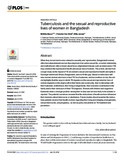| dc.contributor.author | Barua, Mrittika | |
| dc.contributor.author | Driel, Francien Van | |
| dc.contributor.author | Jansen, Willy | |
| dc.date.accessioned | 2022-03-08T05:50:44Z | |
| dc.date.available | 2022-03-08T05:50:44Z | |
| dc.date.copyright | 2018 | |
| dc.date.issued | 2018-07-19 | |
| dc.identifier.citation | Barua, M., Van Driel, F., & Jansen, W. (2018). Tuberculosis and the sexual and reproductive lives of women in bangladesh. PLoS ONE, 13(7) doi:10.1371/journal.pone.0201134 | en_US |
| dc.identifier.uri | http://hdl.handle.net/10361/16418 | |
| dc.description | This article was published in the PLOS ONE [© 2018 Barua et al. This is an open
access article distributed under the terms of the Creative Commons Attribution License ] and the definite version is available at: https://doi.org/10.1371/journal.pone.0201134 The Journal's website is at: https://journals.plos.org/plosone/article/citation?id=10.1371/journal.pone.0201134 | en_US |
| dc.description.abstract | When they do not meet norms related to sexuality and reproduction, Bangladeshi women
often face abandonment and are thus deprived of an active sexual life, a marital relationship,
and motherhood. Little is known about how a stigmatised disease such as tuberculosis (TB)
may constrain the reproductive health and sexual lives of women. This article, derived from
a larger study on the impact of TB on women’s sexual and reproductive health and rights in
Narsingdi district and Dhaka, Bangladesh, aims to fill this gap. Based on interviews with
nine married women who have or had TB, four husbands, and two mothers-in-law, this article highlights that the ways in which TB impedes on the sexual and reproductive lives of
women depends on the stigma within their family and community, their relationships with
their husbands, motherhood, their living arrangements, their economic contribution to the
family and/or their disclosure of their TB diagnosis. Women with children and supportive
husbands retain a stronger position among their in-laws and are less likely to be isolated or
rejected. The patients’ narratives revealed that the instructions of health workers influenced
their decisions about intercourse or abstinence. Future studies should examine the instructions patients receive from health workers regarding their living and sleeping arrangements,
sexual intercourse, and pregnancy, as well as policy documents on TB treatment and
prevention. | en_US |
| dc.language.iso | en_US | en_US |
| dc.publisher | PLOS ONE | en_US |
| dc.relation.uri | https://journals.plos.org/plosone/article/citation?id=10.1371/journal.pone.0201134 | |
| dc.subject | Tuberculosis | en_US |
| dc.subject | sexual and reproductive lives | en_US |
| dc.subject | Women in Bangladesh | en_US |
| dc.title | Tuberculosis and the sexual and reproductive lives of women in Bangladesh | en_US |
| dc.type | Journal Article | en_US |
| dc.description.version | Published | |
| dc.contributor.department | Brac James P. Grant School of Public Health | |
| dc.identifier.doi | https://doi.org/10.1371/journal.pone.0201134 | |

